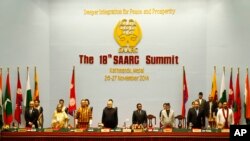Nepal urged South Asian nations on Thursday to create a "conducive environment'' so a regional summit can be held as scheduled in November in Pakistan's capital.
Nepal, the current chair of the South Asian Association for Regional Cooperation, said four of the eight member nations have indicated they will not attend the Nov. 9-10 summit in Islamabad.
Tensions between Pakistan and India have been high since a militant attack on an Indian army base in Kashmir killed 18 Indian soldiers. India, which said the militants were from a Pakistan-based group, announced on Tuesday that it would not participate in the summit.
Soon after India's announcement, Bangladesh, Afghanistan and Bhutan also said they would not join the summit in Pakistan.
In a statement issued by its foreign ministry, Nepal strongly urged the creation of a conducive environment so all members of the regional grouping could attend.
SAARC, consisting of Afghanistan, Bangladesh, Bhutan, India, the Maldives, Nepal, Sri Lanka, and Pakistan, was founded in 1985 to promote economic cooperation in the region, but tensions between India and Pakistan have repeatedly blocked progress.
In announcing it would not attend, India cited increasing terror attacks in the region and blamed "one member'' for interfering in the internal affairs of member states. It said the atmosphere was not conducive for a successful summit. It did not name Pakistan directly.
Pakistan accused India on Thursday of impeding SAARC. Foreign Ministry spokesman Nafees Zakaria said India's decision to stay away from the summit was aimed at diverting the attention of the international community from human rights violations in the India-controlled portion of Kashmir.
More than 80 civilians have been killed in Kashmir since July in the largest protests against Indian rule in recent years, sparked by the killing of a popular rebel commander by Indian soldiers.
Nepal Urges 'Conducive Environment' for South Asian Summit

KATHMANDU, NEPAL —



